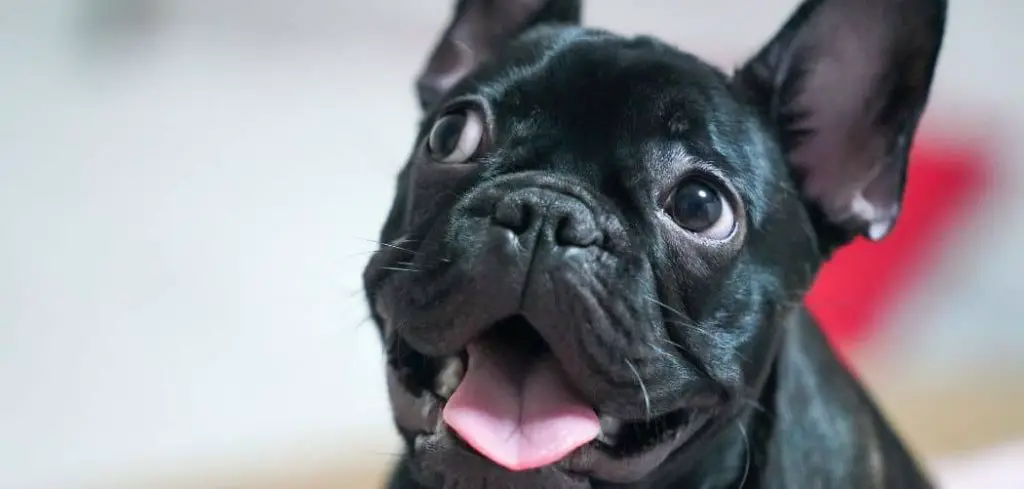Dogs sometimes display unusual behaviors that leave owners puzzled, and one of these is air licking. A dog that constantly licks at nothing may appear quirky at first, but it can be a sign of an underlying issue.
We outline the common reasons why a dog may constantly lick air, what you can do, and when to seek veterinary help.
Dog Constantly Licking Air — Why It Happens
A dog constantly licking air may be driven by several possible causes including nausea, dental problems and neurological disorders. Sometimes, licking is a response to discomfort in the stomach or mouth, while in other cases it may signal stress, anxiety, or even a seizure-related condition.
Certain behavioral compulsions can also cause repetitive air licking, and some dogs may be reacting to environmental irritants.
Because the cause varies so widely, careful observation and veterinary input are often necessary.

Dog Constantly Licking Air: Common Causes
Nausea or Gastrointestinal Upset
When a dog feels nauseous, licking motions often increase as a way to cope with stomach discomfort.
Dogs experiencing acid reflux, gastritis, or even something as simple as eating too quickly may begin licking the air.
Owners may also notice drooling, gulping, or attempts to eat grass. This is a significant cause to consider, since gastrointestinal conditions can quickly progress if untreated.
Read more: Dog Constantly Licking Bottom (What’s behind this behavior?)
Dental Disease or Oral Pain
Tooth decay, gum infections, or even something lodged in the mouth can cause dogs to lick at the air as a reaction to discomfort.
In these cases, air licking is often paired with pawing at the mouth, reluctance to eat, or bad breath.
Oral disease is common in dogs, and if untreated, it can lead to severe pain and even systemic infections.
Seizure Disorders or Neurological Problems
Some dogs with epilepsy or other neurological disorders develop unusual repetitive behaviors, including air licking.
These may occur before, during, or after seizures, or as part of partial seizures that don’t look like full convulsions.
Dogs may appear dazed, unresponsive, or show other odd behaviors alongside the licking. Because neurological problems can be life-altering, veterinary evaluation is important.
Anxiety or Stress-Related Behavior
Compulsive licking can sometimes be a self-soothing behavior in anxious or stressed dogs.
Dogs left alone for long periods, exposed to loud noises, or experiencing major life changes may develop repetitive licking behaviors. Unlike playful or curious licking, this behavior tends to appear more persistent and context-driven.
Addressing stress and providing enrichment can help, but professional behavioral guidance may be necessary.
Foreign Object or Irritant
Dogs occasionally encounter irritants that trigger strange licking behaviors. This could be a small piece of food stuck in the mouth, an insect sting, or even an irritant inhaled from the environment.
If the behavior appears suddenly and the dog is pawing at its face or acting uncomfortable, this possibility should be considered.
Quick inspection or veterinary evaluation is recommended to rule out a blockage or injury.
Liver or Kidney Disease
Though less common, systemic diseases like liver disease or kidney failure can lead to nausea and unusual behaviors such as air licking.
Dogs with these conditions may also show symptoms such as vomiting, loss of appetite, weight loss, or lethargy.
Because these diseases are serious and require ongoing care, air licking paired with other signs should be promptly investigated.
What to Do If Your Dog Is Constantly Licking Air
If your dog is constantly licking air, start by observing when it happens and what other symptoms are present.
If the behavior only occurs occasionally after eating, it may not be urgent, but persistent or worsening cases should raise concern.
Providing fresh water and monitoring eating habits can help you identify if nausea or reflux is the trigger.
Keeping a log of your dog’s behavior, including when the licking occurs and any additional symptoms, can be extremely helpful for your vet.
If stress is suspected, providing more exercise, mental enrichment, and a stable environment can reduce the behavior. For dogs with anxiety-driven licking, calming supplements or professional behavior modification may also be beneficial.
Always check your dog’s mouth gently for signs of debris, broken teeth, or gum problems. However, if your dog resists inspection, leave this to your vet to avoid causing pain.
When to Call or Visit Your Vet
If your dog’s air licking is persistent, paired with drooling, vomiting, or lethargy, veterinary attention is recommended. Nausea, dental pain, or systemic illness should not be left untreated.
Seek immediate veterinary care if your dog shows sudden air licking with signs of choking, pawing at the mouth, or collapse, as these may signal a medical emergency.
If neurological issues are suspected—such as air licking associated with disorientation, seizures, or strange repetitive movements—schedule an appointment promptly. These conditions often require diagnostics and long-term management.
Even in cases where anxiety is the likely cause, a veterinarian or veterinary behaviorist can help rule out medical conditions before focusing on behavioral strategies.
Read more: Dog Constantly Has Diarrhea (Why it happens)
Key Takeaway
A dog constantly licking air may look like a harmless quirk, but it can signal anything from nausea to neurological problems.
Paying close attention to when and how the behavior occurs can help guide whether it’s a minor issue or something requiring urgent care.
If your dog develops persistent air licking or shows additional symptoms, contacting a veterinarian is the safest choice. With early attention, most underlying causes can be managed effectively, helping your dog feel comfortable and healthy again.
